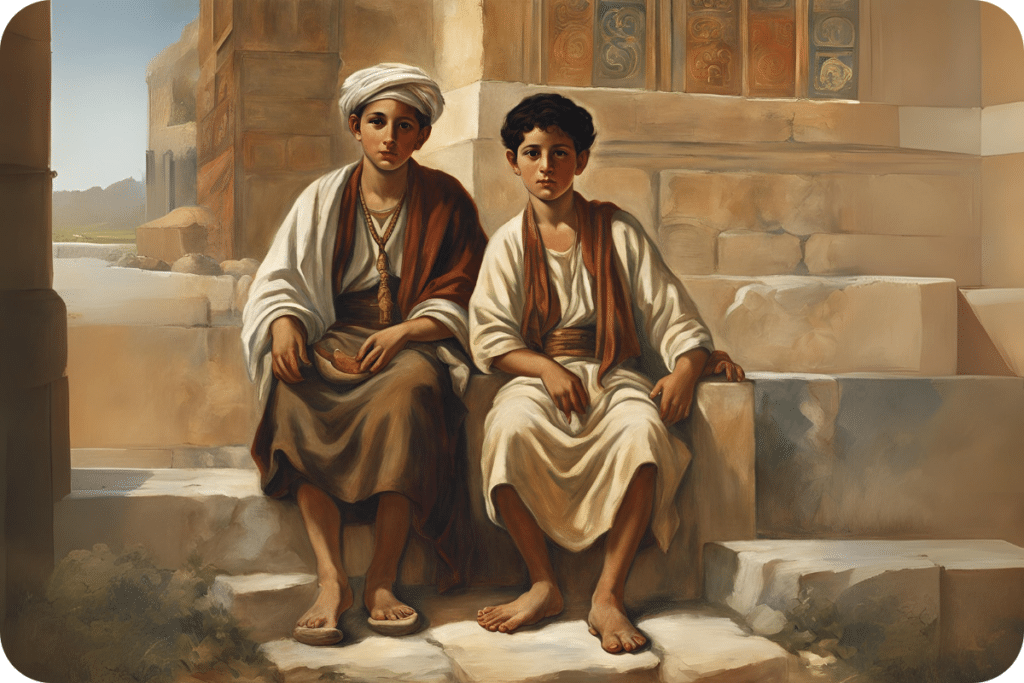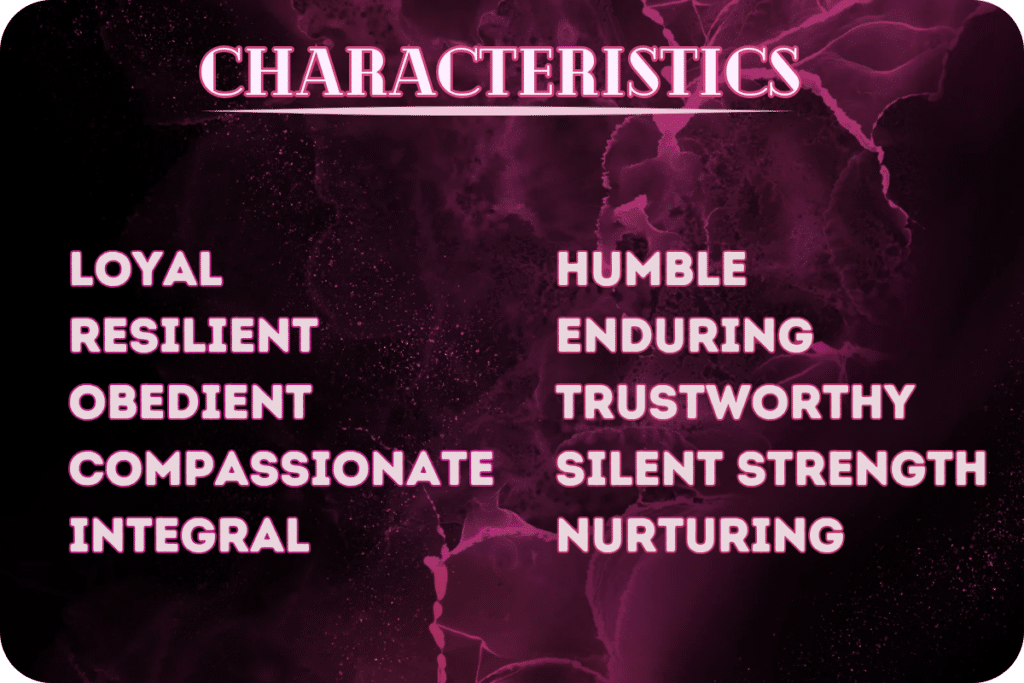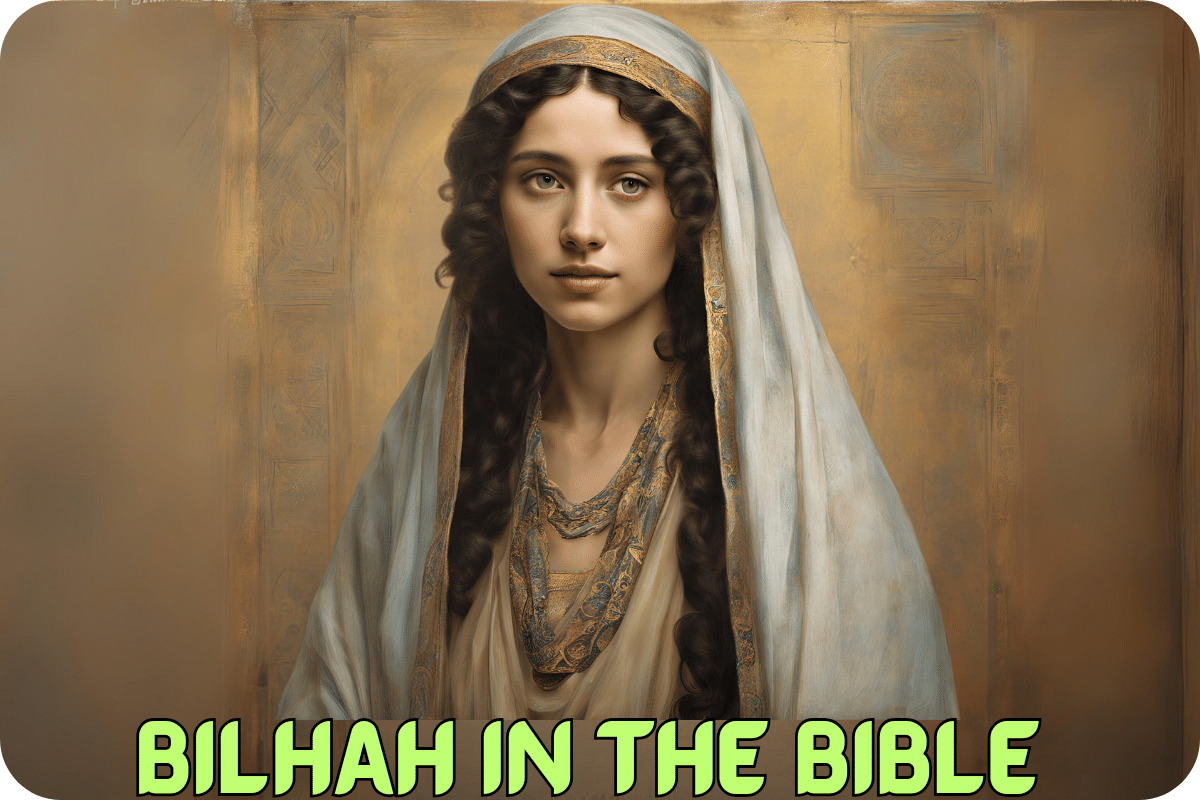BRAVE BILHAH IN THE BIBLE
Understanding the complexities of the Bible often involves delving into the lives of its lesser-known figures. One such intriguing character is Bilhah. Although not as prominent as other biblical figures, the story of Bilhah in the Bible, offers a compelling glimpse into the cultural and familial dynamics of ancient times.

The name “Bilhah” is of Hebrew origin. In Hebrew, Bilhah (בִּלְהָה) is often interpreted to mean “troubled” or “bashful.”The name Bilhah comes from the root word “בלח” (B-L-H) in Hebrew, which suggests feelings of weariness or distress.
Who is Bilhah in the Bible?
Bilhah in the Bible, Rachel’s handmaid, was given to Jacob as a concubine when Rachel was unable to conceive. Bilhah bore two sons, Dan and Naphtali, who were considered Rachel’s children. Later, Reuben, Jacob’s eldest son, slept with Bilhah, an act that cost him his birthright.
Bilhah’s story highlights the complex family structures and cultural practices of the time, where a handmaid could be used as a surrogate to continue the family line. Despite her humble beginnings, Bilhah’s sons founded two of the twelve tribes of Israel, demonstrating how God can use anyone for His greater purposes.
Introduction of Bilhah in the Bible
Bilhah in the Bible, is first introduced in Genesis 29:29, where she is given to Rachel by her father, Laban, as a maidservant. This seemingly minor detail sets the stage for her later involvement in the complex family dynamics that unfold in the subsequent chapters.
Bilhah as Rachel’s Handmaid
In ancient Israel, handmaids like Bilhah in the Bible played significant roles beyond their immediate duties. They were often surrogate mothers, a practice that was culturally accepted and reflected the social norms of the time. Rachel, who was initially barren, saw Bilhah as a means to bear children through Jacob.
Bilhah’s Role in Jacob’s Family

Bilhah’s relationship with Jacob was primarily functional, as she served as a surrogate mother to provide him children when his wife Rachel was unable to conceive. When Rachel gave Bilhah to Jacob as a concubine, Bilhah in the Bible bore two sons, Dan and Naphtali, who were considered Rachel’s children, thus enhancing her own status within the family. This arrangement highlights the cultural practice of using handmaids as surrogates to continue the family line and enhance the status of the barren wife.
Bilhah’s Sons: Dan and Naphtali
The births of Dan and Naphtali, sons of Jacob’s concubine Bilhah, were significant as they became founders of two of the Twelve Tribes of Israel. Dan’s name means “judgment” or “he has judged,” reflecting Rachel’s sense of vindication in providing Jacob with an heir.

Naphtali’s name, meaning “my struggle,” signifies the ongoing familial tensions and Rachel’s victory through Bilhah’s children. Despite their humble beginnings as sons of a handmaid, Dan and Naphtali’s tribes played important roles in the history of Israel, demonstrating how God can use anyone for His greater purposes.
Cultural Context of Bilhah’s Story
In ancient Israel, marriage and concubinage practices were complex. Women like Bilhah, though handmaids, held essential roles in family structures. They could bear children for their mistresses, a practice that was a pragmatic solution to infertility issues. This arrangement was culturally accepted and reflected the social norms of the time.
Bilhah’s Relationship with Leah
The dynamics between Bilhah and Leah, Rachel’s sister, further highlight the complex family dynamics in Jacob’s household. When Rachel was unable to conceive, she gave her handmaid Bilhah to Jacob as a concubine, so that Bilhah could bear children on Rachel’s behalf. Leah, seeking to compete with Rachel, then used her own handmaid Zilpah in a similar capacity.
This rivalry between the sisters and their use of their handmaids as surrogates underscores the competitive nature of polygamous households in ancient times, where women had to navigate complex social and familial structures to secure their status and provide heirs for their.
Bilhah’s Relationship with Rachel
Rachel’s desperation for children led her to give her handmaid Bilhah to Jacob as a concubine, a culturally accepted practice at the time. This arrangement, though driven by necessity, reflects the deep emotional and societal pressures faced by women like Rachel who were unable to conceive. The role of Bilhah in the Bible, as a surrogate mother allowed Rachel to claim Bilhah’s children, Dan and Naphtali, as her own, highlighting the unique bond between the two women.
Bilhah’s Place in Biblical Narratives
The story of Bilhah in the Bible, like that of Hagar, highlights the roles of women in ancient patriarchal societies. Both Bilhah and Hagar were handmaids who bore children for their mistresses, contributing to the lineage of the Israelites. Bilhah, given to Rachel by Laban, bore two sons, Dan and Naphtali, who were considered Rachel’s children.
Hagar, given to Sarah by Pharaoh, bore Ishmael, who became the father of a significant tribe. These narratives illustrate the complex family structures and the cultural practices of the time, where handmaids played essential roles in continuing the family line despite their humble beginnings.
Lessons from Bilhah in the Bible
Bilhah in the Bible, offers several profound lessons through her life and experiences. Here are some key takeaways:
1. Resilience in Adversity
The life of Bilhah in the Bible, was marked by challenging circumstances. As a handmaid, she had limited autonomy and was subjected to the decisions of her masters. Despite these hardships, Bilhah’s resilience shines through. Her ability to navigate the complexities of her role within Jacob’s household demonstrates strength and perseverance in the face of adversity.
2. The Value of Service
The story of Bilhah in the Bible, underscores the significance of service and loyalty. She served Rachel faithfully and fulfilled her duties, which were critical to Rachel’s and Jacob’s aspirations. Her service was not just a duty but a form of devotion and loyalty, highlighting the importance of fulfilling one’s responsibilities with dedication.
3. Complex Family Dynamics
The dynamics within Jacob’s family were intricate and often fraught with tension. Bilhah’s role in this environment teaches us about the complexities of family relationships, especially in polygamous households. Her interactions with Rachel, Leah, and Jacob reflect the delicate balance of power, loyalty, and competition that can exist in familial settings.
4. Unseen Contributions
While Bilhah might not be a central figure in the biblical narrative, her contributions were crucial. She bore two of the Twelve Tribes of Israel, Dan and Naphtali, playing a key role in the fulfillment of Jacob’s lineage. This teaches us that significant contributions can come from those who might not be in the spotlight, emphasizing the importance of recognizing and valuing all roles within a community.
5. Faith and Trust
The story of Bilhah in the Bible, is also a testament to faith and trust. Her life and actions were deeply intertwined with the faith and hopes of Rachel and Jacob. This reliance on divine providence, even through unconventional means, reflects a broader theme in the Bible about trusting in God’s plan and the various ways it can manifest.
6. Social and Cultural Context
Understanding Bilhah’s story also provides insights into the social and cultural norms of ancient Israel. Practices such as concubinage and surrogate motherhood, which seem foreign today, were accepted and played specific roles in maintaining family lineage and social stability. Bilhah’s life offers a window into these ancient practices and their significance.
7. Empowerment through Endurance
Despite her position as a handmaid, Bilhah’s endurance and the roles she fulfilled brought her a measure of empowerment. Her story shows that strength and influence can emerge from enduring and navigating difficult circumstances with grace and determination.
8. Legacy and Influence
The legacy of Bilhah in the Bible, through her sons Dan and Naphtali, is an enduring one. Her story teaches us about the lasting impact one can have through their descendants and the importance of each individual in the broader tapestry of history and legacy.
The life of Bilhah, though not elaborately detailed in the Bible, provides rich lessons on resilience, service, family dynamics, and the enduring impact of individual contributions. Her story is a powerful reminder of the diverse roles and experiences that shape biblical history and its teachings.
Bilhah in Jewish Tradition
In rabbinic literature, Bilhah is sometimes portrayed in a more positive light than in the biblical narrative. The Zohar states that after the deaths of Rachel and Leah, the Shekhinah (divine presence) passed to Bilhah, indicating her righteousness. The Midrash Rabbah identifies Bilhah as the messenger sent by Joseph’s brothers to inform him of Jacob’s will.
These traditions suggest that despite her humble status as a handmaid, Bilhah was a virtuous woman who played a significant role in the lives of her descendants and in the history of Israel. Her story highlights the complex social structures of ancient times and the ways in which even marginalized figures could contribute to the larger narrative.
Bilhah in Christian Interpretation
Christian interpretations of Bilhah’s story often portray her as a symbol of faith and endurance. Despite her humble status as a handmaid, Bilhah’s narrative is used to illustrate themes of trust in divine providence and the complexities of human relationships. The willingness of Bilhah in the Bible, to bear children for Rachel, even though they were not her own, demonstrates her selflessness and commitment to her mistress.
Her sons, Dan and Naphtali, went on to become founders of two of the twelve tribes of Israel, highlighting how God can use anyone for His greater purposes, regardless of their social standing. Bilhah’s story encourages believers to have faith in God’s plan, even when faced with difficult circumstances.
Modern Interpretations of Bilhah’s Story
Contemporary biblical scholarship has shed new light on Bilhah’s story, moving beyond the traditional narrative. Feminist and womanist interpretations highlight how Bilhah, as a handmaid, represents the marginalized and oppressed women whose voices are often unheard. These perspectives emphasize the importance of reading Bilhah’s narrative through an intersectional lens, considering the complex interplay of gender, race, and class.
Characteristics of Bilhah in the Bible

Bilhah in the Bible, whose story is intertwined with that of Jacob, Rachel, and Leah, embodies several notable characteristics. These traits help us understand her role and significance within the biblical narrative.
1. Loyal
Bilhah in the Bible, exhibited unwavering loyalty, particularly to Rachel, her mistress. This loyalty is evident in her willingness to serve Rachel faithfully and fulfill her duties without complaint. Her commitment to Rachel’s wishes, especially in bearing children on her behalf, underscores her dependable and devoted nature.
2. Resilient
Resilience is a defining trait of Bilhah. Despite being a handmaid with limited autonomy, she navigated the challenges of her life with strength and perseverance. Her ability to endure the complex family dynamics and societal expectations placed upon her highlights her inner fortitude.
3. Obedient
Bilhah’s obedience is a significant aspect of her character. She followed the instructions given to her by Rachel and Jacob, accepting her role in their plans to build their family. This obedience was crucial in maintaining harmony and fulfilling the expectations of her position.
4. Compassionate
While the Bible does not delve deeply into her emotional state, Bilhah’s actions suggest a compassionate nature. Her willingness to bear children for Rachel indicates a deep understanding of Rachel’s anguish and a desire to alleviate her mistress’s sorrow.
5. Integral
Bilhah in the Bible, played an integral role in Jacob’s family. By bearing Dan and Naphtali, she directly contributed to the formation of the Twelve Tribes of Israel. This integral role highlights her importance within the broader narrative of the Israelites’ ancestry and heritage.
6. Humble
Humility is another key characteristic of Bilhah in the Bible. As a handmaid, she accepted her position without seeking recognition or power. Her humble acceptance of her role and responsibilities demonstrates her modesty and selflessness.
7. Enduring
Bilhah’s enduring nature is evident in how she managed her life’s circumstances. She lived through the complexities and rivalries within Jacob’s household, maintaining her place and fulfilling her duties without faltering.
8. Trustworthy
Her trustworthiness is apparent through the trust placed in her by Rachel and Jacob. Bilhah was entrusted with the significant responsibility of bearing children, a task that required immense trust and reliability.
9. Silent Strength
The story of Bilhah in the Bible, is marked by a quiet strength. While she may not have been a vocal figure, her actions and the roles she played speak volumes about her inner strength and resilience. This silent strength is a powerful aspect of her character.
10. Nurturing
As a mother to Dan and Naphtali, Bilhah’s nurturing nature would have been central to her role. Her care for her children and her contribution to their upbringing would have been essential in the early development of these future tribal leaders.
Bilhah’s characteristics paint a picture of a woman who, despite her secondary status, played a crucial role in the biblical narrative. Her loyalty, resilience, obedience, compassion, and other traits make her an essential figure in the story of Jacob’s family and the broader history of the Israelites.
Conclusion
Bilhah in the Bible may not be a central figure, but her story is integral to understanding the complexities of Jacob’s family and the social norms of ancient Israel. Through her narrative, we gain insights into the roles of women in biblical times, their struggles, and their contributions to the enduring legacy of the Israelites.
Reference
Unique FAQ’s
1. Who were Bilhah’s children?
Bilhah’s children were Dan and Naphtali, who became leaders of two of the Twelve Tribes of Israel.
2. What was Bilhah’s relationship with Jacob?
Bilhah was a handmaid to Rachel and became a concubine to Jacob, bearing him two sons.
3. How does Bilhah’s story compare to other biblical figures?
Bilhah’s story is similar to that of other handmaids like Hagar, highlighting the complex family dynamics and social roles of women in biblical narratives.
4. Why is Bilhah significant in the Bible?
Bilhah’s significance lies in her role in Jacob’s family, her contribution to the Twelve Tribes of Israel, and her reflection of the social customs of her time.
5. How is Bilhah viewed in modern biblical studies?
Modern biblical studies view Bilhah through various lenses, including feminist interpretations, which explore her role and significance in the broader context of biblical history.


1 thought on “55. BRAVE BILHAH IN THE BIBLE”